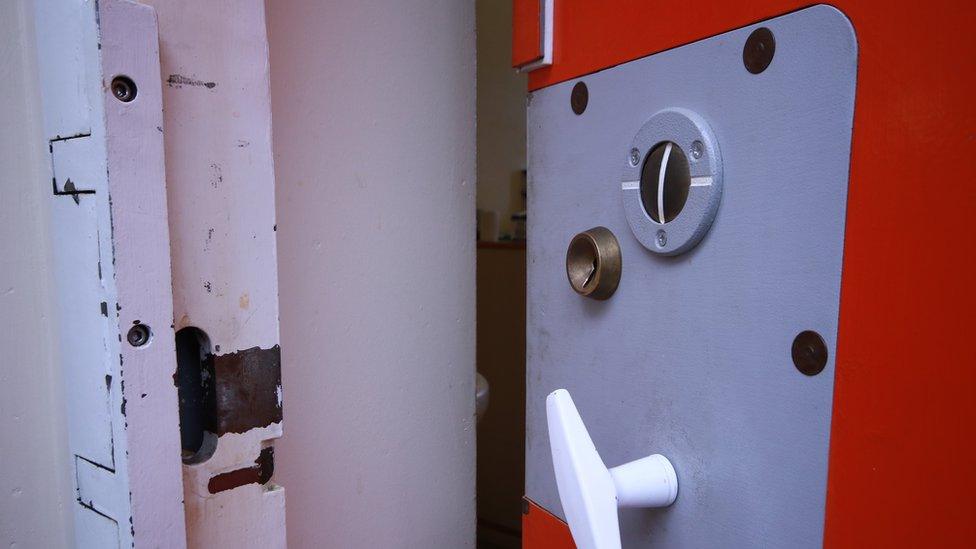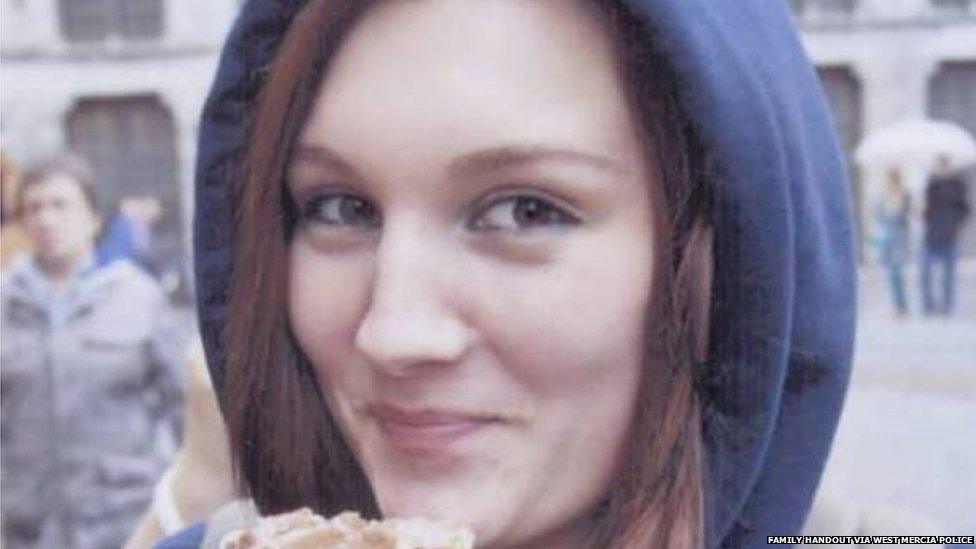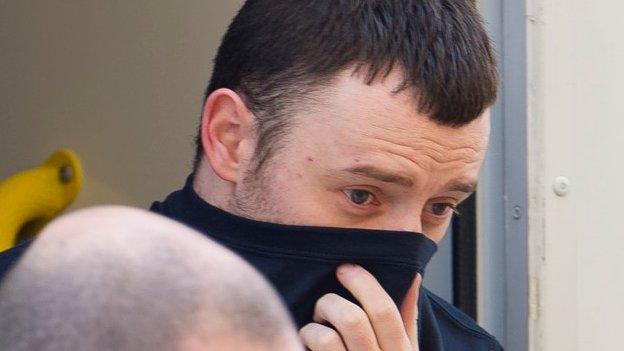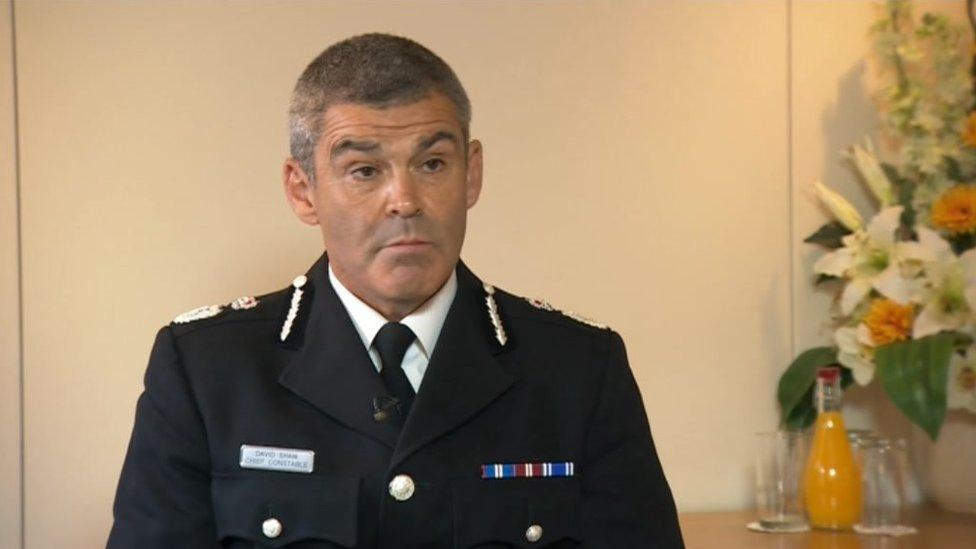Violent offenders: Fears over management after release
- Published

David Alun Lewis was murdered by a man who had recently been released from prison
Is the system in place to manage dangerous offenders when they are released from prison keeping people safe?
Hetty Lewis's son, David Alun Lewis, was murdered in March 2014.
"It was horrendous," she explains. "The liaison officers came on the Thursday night to tell us that he had been killed the previous evening. There were over 80 injuries to his head and his body and the man dumped him in the River Taff. It was a terrible, terrible, brutal death."
In the living room of her home in Ystrad Mynach in south Wales, she sits holding her husband Glyn's hand as they describe the impact of their son's murder. "I can't explain it. It's too emotional. Sometimes it feels as if it's a nightmare."
David was 45 when he was killed. Hetty remembers him as "very reserved, deep-thinking and very thoughtful".
A worker in the nuclear industry, he spent much of his life battling alcoholism and depression and would sometimes stay in hostels. He was described in court as "vulnerable".
"He was a very, very intelligent young man," his mother told the BBC, "but he suffered a lot from anxiety and depression and consequently I think he took to drink.
"He left us a few days before he was murdered because the doctors stopped the medication and he was desperate. The only other thing was drink and he went down to stay at one of the hostels in Cardiff."
It was while he was staying in a homeless centre in the city that he met the man who was to kill him.
Gareth Wyn Jones, then aged 28, had recently been released from prison. He was jailed for six years in 2011 following an attack on his former girlfriend, and had a history of drug and mental health problems.
Because of his conviction, Jones fell under the care of Multi-Agency Public Protection Arrangements, known as Mappas.
The Mappa system is designed to assess and manage the risk posed by the most serious sexual and violent offenders, and reduce the chances of them re-offending. It requires the police, probation, prisons and other agencies to work together to assess the level of risk, share information and put a joint plan in place.
Jones told professionals that he was anxious about being let out, fearing he would relapse into drug abuse if placed into a homeless hostel. It was agreed that he needed permanent accommodation in order to access mental health treatment.

Anonymous probation staff have told Five live Investigates of their concerns that Mappa cases are not being given the scrutiny they need
But no accommodation was found and he was placed in a homeless centre in Cardiff without access to mental health support. Within five days of being released, he murdered David Lewis. A serious case review into the circumstances of the killing has been undertaken.
Latest available government figures show a rise in reoffending by criminals managed under the Mappa system. In 2013-14, 174 registered sex offenders and violent criminals under probation supervision were charged with a serious further offence - a 17% increase on the previous year, and the highest level in four years.
Figures show that this type of reoffending increased each year between 2010-11 - when 134 Mappa-eligible offenders, supervised by probation trusts, were charged - and 2012-13, when the figure was 149.
Five live Investigates heard concerns from anonymous probation staff that Mappa cases are not being given the scrutiny they need. One told the programme: "We spend 10 to 15 minutes discussing each case at Mappa when it used to be an hour per case."
Another told the programme that "trainees are now holding Mappa cases and don't have the experience to manage these".
Concern
But there are also worries that some dangerous individuals are failing to be picked up by the system in the first place.
Seventeen-year-old Georgia Williams was murdered in 2013 by Jamie Reynolds. Several years earlier he had attempted a similar attack on another young woman and had previously been assessed as "a significant risk to others".
While various agencies had been working with Reynolds since 2008, he was not under Mappa procedures. But a recently published serious case review, external suggests that he should have been.
The report stated: "It is possible that Mappa management could have helped ensure a co-ordinated, multi-agency approach which may have led to a clearer understanding of risk issues and how they may have been managed."

Georgia Williams was killed by a man who had tried to carry out a similar attack on a previous occasion
Georgia's mother, Lynnette Williams, told the BBC: "If they had, then Reynolds would have been on the radar of these people. All sorts of agencies would then have been involved properly and perhaps he wouldn't be in the position he's in, as well as Georgia."
Earlier this week, HM Inspectorate of Probation published a wider review of the multi-agency arrangements, external. It found improvements in its processes, such as a lead agency taking charge of each case, agencies being held to account, and minutes of Mappa meetings improving.
Chief inspector of probation Paul Wilson said: "Recommendations from the last inspection had been substantially implemented and overall the quality of work was improved."
However, the report noted continuing areas of concern. It found that risk management plans "were still not good enough". It also said that probation staff do not have enough computer terminals to access a central database holding information about offenders who pose a serious risk of harm.
A Ministry of Justice spokesman said the chief inspector of probation's report recognised that in the majority of cases offenders were being managed appropriately, but added that the ministry was already working to implement the report's recommendations.
"Mappa manage some of the highest risk offenders in the community, and less than 1% go on to be charged with a serious further offence," the spokesman added.
Of the decision not to refer Jamie Reynolds to Mappa, the Ministry of Justice said: "This was a tragic case and we will address its findings in our review of the Mappa national guidance."
5 live Investigates is on BBC Radio 5 live at 11:00 GMT on Sunday 25 October. Listen online or download the programme podcast.
- Published22 October 2014

- Published14 October 2015
